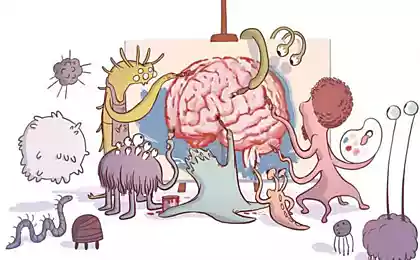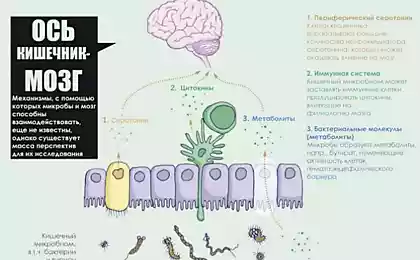680
Think of stress - just a bother? You will be surprised when you find out what it does to your brain!
Stress affects your brain is much stronger than you think. Of course you experienced forgetfulness, confusion, anxiety and other negative factors that were the result of stress. But did you know that in this way the volume of the brain is reduced? The hormones released in response to stress, not only affect the function of the brain, but also alter its physical structure.

cortisol - "stress hormone" - can reduce and stop the generation of new neurons in one of the areas of the brain - the hippocampus. The hippocampus is the primacy of learning, memory and emotional regulation, and is also responsible for disabling reactions to stress. In short, the hippocampus governs crucial processes in professional activities, as well as in personal life.
Chronic stress reduces the volume of the medial prefrontal cortex. This adversely affects the ability of decision-making, concentration and control impulsive behavior. Stress can also affect the stem cells, preventing access to the prefrontal cortex, which is planned to cognitive behavior and social interaction scenarios. As a result, the brain is less capable of learning and memory, but more prone to anxiety and depression.
Worse still, the same stress hormones can increase the volume of the amygdala, which is critical in the formation and storage of emotional ties. This chain of events and feelings, which is stored in non-volatile memory so that we can avoid a repetition of certain events in the future. Increased levels of cortisol increases negative emotions - fear, anxiety, aggressiveness.
These changes in the brain may have significant implications for our ability to interact with other people, learning, memory, decision-making and long-term goals. They also make it difficult to control stressful situations in the future, leading to a vicious circle.
Fortunately, we found a very effective remedy for these changes - exercise. They will help build stressoustojchivyj brain and increase its size and ability to learn.
Exercise stimulates the release of a substance called "brain-derived neurotrophic factor» (BDNF), which helps in the development of healthy brain tissue and compensating the negative effects of stress. Think of it as fertilizer for the brain. It retains the existing neurons alive and healthy, but also stimulates the growth of new ones. The more you do, the more BDNF you create and the more neurons are generated - especially in the hippocampus.
Also exercises release of growth hormone (HGH), which is vital for the growth and development of cells of the brain and body. Growth hormone counteracts the natural cellular atrophy and increases the volume of the brain. Thirty-jerk sprint can generate six-fold increase HGH from a peak of 2 hours.
Fortunately, you do not have to deal with for hours to get all of these benefits. A recent analysis of a dozen studies have shown that five-minute periods of exercise as much as possible to help improve mood and fight stress. Whenever you have a few free minutes, do something that quickens the heartbeat and strengthens muscles. This is an excellent and constructive way to deal with stress and a decrease in the brain!
Share this information with your friends - it will be useful to anyone who is committed to making your life easier and more enjoyable!
www.huffingtonpost.com/jenny-c-evans/how-stress-is-literally-m_b_6064966.html?ncid=fcbklnkushpmg00000063

cortisol - "stress hormone" - can reduce and stop the generation of new neurons in one of the areas of the brain - the hippocampus. The hippocampus is the primacy of learning, memory and emotional regulation, and is also responsible for disabling reactions to stress. In short, the hippocampus governs crucial processes in professional activities, as well as in personal life.
Chronic stress reduces the volume of the medial prefrontal cortex. This adversely affects the ability of decision-making, concentration and control impulsive behavior. Stress can also affect the stem cells, preventing access to the prefrontal cortex, which is planned to cognitive behavior and social interaction scenarios. As a result, the brain is less capable of learning and memory, but more prone to anxiety and depression.
Worse still, the same stress hormones can increase the volume of the amygdala, which is critical in the formation and storage of emotional ties. This chain of events and feelings, which is stored in non-volatile memory so that we can avoid a repetition of certain events in the future. Increased levels of cortisol increases negative emotions - fear, anxiety, aggressiveness.
These changes in the brain may have significant implications for our ability to interact with other people, learning, memory, decision-making and long-term goals. They also make it difficult to control stressful situations in the future, leading to a vicious circle.
Fortunately, we found a very effective remedy for these changes - exercise. They will help build stressoustojchivyj brain and increase its size and ability to learn.
Exercise stimulates the release of a substance called "brain-derived neurotrophic factor» (BDNF), which helps in the development of healthy brain tissue and compensating the negative effects of stress. Think of it as fertilizer for the brain. It retains the existing neurons alive and healthy, but also stimulates the growth of new ones. The more you do, the more BDNF you create and the more neurons are generated - especially in the hippocampus.
Also exercises release of growth hormone (HGH), which is vital for the growth and development of cells of the brain and body. Growth hormone counteracts the natural cellular atrophy and increases the volume of the brain. Thirty-jerk sprint can generate six-fold increase HGH from a peak of 2 hours.
Fortunately, you do not have to deal with for hours to get all of these benefits. A recent analysis of a dozen studies have shown that five-minute periods of exercise as much as possible to help improve mood and fight stress. Whenever you have a few free minutes, do something that quickens the heartbeat and strengthens muscles. This is an excellent and constructive way to deal with stress and a decrease in the brain!
Share this information with your friends - it will be useful to anyone who is committed to making your life easier and more enjoyable!
www.huffingtonpost.com/jenny-c-evans/how-stress-is-literally-m_b_6064966.html?ncid=fcbklnkushpmg00000063
Two brothers perfectly recreate his childhood photos for the wedding anniversary of the parents.
Spectacular images of the cockpit. The pilot showed how he sees the world.























